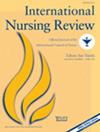Ethical boundaries and data-sharing practices in AI-enhanced nursing: An Arab perspective
Abstract
Aim
This study explored the ethical boundaries and data-sharing practices in artificial intelligence (AI)-enhanced nursing from the perspective of Arab nurses.
Background
Although AI offers advancements in clinical decision-making and operational efficiency, it also presents challenges such as ethical dilemmas, data privacy concerns, and technical issues. These challenges are being addressed through continuous education, the development of robust ethical guidelines, and the implementation of transparent data-sharing practices
Methods
A qualitative approach was employed, adhering to the Standards for Reporting Qualitative Research (SRQR) guidelines. Fourteen registered nurses from healthcare facilities in Abha City, Saudi Arabia, were selected through purposive sampling. Data were collected through semistructured interviews, observational data and document analysis. Thematic analysis was used to analyze the data.
Results
Nurses reported that AI technologies enhance clinical decision-making and efficiency by automating routine tasks. However, they also highlighted ethical challenges, including conflicts between AI recommendations and patient preferences, the need for continuous training, and resource constraints. The importance of maintaining human interaction and empathy in nursing practice was emphasized.
Discussion
The findings align with existing literature on the benefits and challenges of AI in nursing. Ethical dilemmas, particularly related to data privacy and informed consent, require careful management. Continuous education and adequate resources are essential for successful AI integration.
Conclusion
AI in nursing not only offers significant benefits but also presents ethical and practical challenges. Clear ethical guidelines, continuous education, and adequate resources are crucial for optimizing AI integration.
Implications for nursing
AI can enhance clinical decision-making and efficiency, allowing nurses to focus on patient interaction and critical thinking.
Implications for health policy
Develop robust ethical frameworks and data protection regulations. Implement continuous professional development programs and ensure adequate resources for AI integration in healthcare.

 求助内容:
求助内容: 应助结果提醒方式:
应助结果提醒方式:


